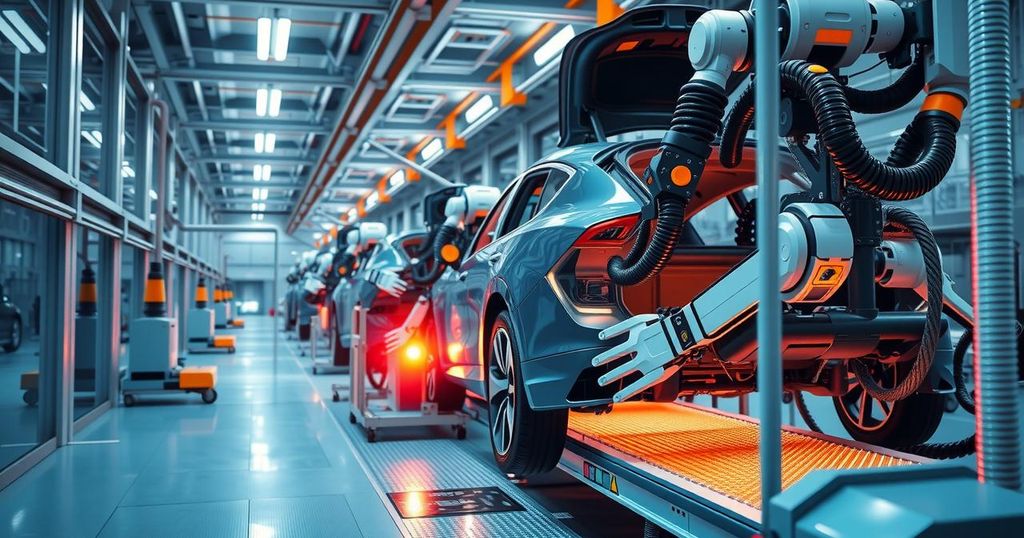Audi Accelerates Production Efficiency with Artificial Intelligence
Audi is significantly enhancing production efficiency through artificial intelligence, implementing over 100 AI projects mainly focused on quality monitoring and generative tools. With data as a core asset, initiatives like Tender Toucan and IRIS highlight Audi’s commitment to modernizing production. Collaborating with IPAI in Heilbronn further solidifies Audi’s role in leading AI integration in the automotive industry.
In a bold leap forward, Audi is ramping up its use of artificial intelligence to significantly enhance production efficiency. The company is integrating AI into various segments—especially in production and logistics—tailoring tools to streamline processes and improve quality. Gerd Walker, a member of Audi’s Board of Management, recently underscored the impact, calling AI a “game changer” in the automotive sector, emphasizing its ability to foster an efficient yet high-quality production environment.
Currently, Audi is rolling out over 100 AI projects at its production facilities. These projects are at differing levels of implementation but target the heart of production processes. The focus has been largely on AI-supported quality monitoring tools and generative AI, which are reshaping how the company approaches manufacturing.
Data forms the backbone of these AI initiatives. Audi’s production division generates the highest data volume within the company—existing data already spans hundreds of petabytes, with fresh data pouring in daily. Walker addressed this density, stating, “Artificial intelligence enables us to make more extensive use of our enormous wealth of data in production”. This influx is crucial for Audi’s ambition to evolve into a fully connected, innovative, and sustainable manufacturing model—known as the 360factory.
One noteworthy project is the “Tender Toucan”, a new AI application that aids in the tendering process. This tool evaluates bids based on predefined criteria, helping employees save about 30% of their time. This summer, it will assist in planning for drivetrains and battery production, and further deployment is in the works across Audi and the larger Volkswagen Group, laying the groundwork for future AI enhancements.
In addition to project management, Audi has also introduced AI-driven quality checks with projects like “IRIS” and “WSD”. The IRIS system scans vehicles in Ingolstadt and Neckarsulm, ensuring labels are affixed correctly—saving about a minute of production time per vehicle. Meanwhile, the WSD project, in collaboration with Siemens, automates the inspection of weld splatter on vehicle underbodies. Starting in 2025, robotic arms will even remove that splatter, thus enhancing production time and occupational safety for the workers.
To support these ambitious AI endeavors, Audi has forged a productive alliance with the Innovation Park Artificial Intelligence (IPAI) in Heilbronn. IPAI is positioning itself as Europe’s largest AI hub, and Audi will soon have its own office on the expansive 23-hectare campus set to be developed this year. The nearby Audi Böllinger Höfe, focused on small series production, acts as a testing ground for these digital advancements as part of the Automotive Initiative 2025—an effort aimed at digital transformation across the automotive landscape.
As Audi pushes forward in its AI journey, it’s clear these technologies are not just about efficiency—they’re changing the game for how vehicles are made and how production environments are structured. As Walker noted, the integration of AI could well define the future of manufacturing within the industry—and Audi appears ready to lead the charge.
Audi is making major strides in integrating artificial intelligence into its production processes. With over 100 AI projects underway, the automotive giant aims to enhance efficiency, cut down costs, and ensure quality. The focus on AI tools like Tender Toucan and monitoring systems like IRIS and WSD showcases a strong commitment to innovation. Partnering with IPAI reinforces Audi’s strategy of advancing digital transformation in manufacturing while ensuring a safer and more efficient workplace. Overall, Audi is positioning itself at the forefront of AI-driven automotive production.
Original Source: www.audi-mediacenter.com




Post Comment